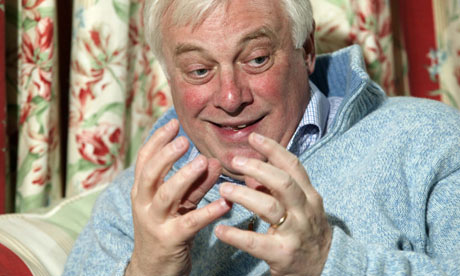
To: Lord Patten of Barnes, chairman, BBC Trust
CC: All desks, BBC
From: Rupert Sawyer, chief executive, Channel 8 Television
Subject: RE: Job Ref. No 800119 (Director-General)
Dear Lord Patten,
I would like to register my interest in the role advertised on the BBC Jobs website entitled Director-General.
As the incumbent is paid a mere £670,000 per annum, Chris, I can only assume you are looking for another part-timer for this position. I would be willing to commit up to 15 hours a week to the job, which would allow me to continue overseeing the Channel 8 empire as well as servicing the needs of the British Broadcasting Corporation.
I do not include my CV as I'm sure you're very much already aware of my credentials, Chris – I am, just like Samantha Brick, burdened by the gifts God gave me . I must admit, it almost feels like the job description was written with me in mind; especially the parts about having "an international mindset" and "understanding of new platforms and technologies". I have been running various successful special interest websites out of Ha Noi, Vietnam, for many years now, and recently acquired Lemon Corps, makers of the revolutionary iFad HP.
It might also be noted that I have both journalistic and programme-making experience, which I realise you value less than the ability to express oneself in 140 characters or fewer, but this might also come in handy running one of the biggest broadcasters on Earth.
But the part that gripped me said: "The trust is looking for an inspirational leader with strong, clear vision."
This, Chris, is my very unique and carefully thought-out vision for Auntie:
1. Trust
You may have already noted that this email is "cc'd" to every member of staff at the BBC. These people pay for your business, gifting (in part) more than £3bn every year – it's only fair that they know everything we ever talk about, and we trust them not tell foreign agents or rogue regimes about the scheduling of Sherlock series three.
But we should also trust the general public – our consumers. Therefore my first action as DG would be to compile an exhaustive list of UK householder's email address and "cc" them into every public service missive too. We are one BBC; and great things happen when we, the nation, WORK TOGETHER.
2. Audiences
I cannot stress enough that audiences should be at the heart of everything that we do. But how can this be the case when currently most of the BBC's programmes are made by the few, rather than the many.
The BBC has around 20,000 permanent staff, but there are more than 60 million people in the United Kingdom.
Chris, as DG, I would use my power and influence to petition the government to reinstate national service. In doing this we could ensure that every young person spent at least six months working for the corporation, learning valuable life skills like organising meetings about other meetings and being underworked and overpaid but still receiving gilt-edged pensions.
The next generation of audiences would be more engaged with the BBC's output, because they would have been involved in making it.
The result – happy engaged audiences for life, no matter how much crap is on the telly.
3. Quality and value for money
I firmly believe the final word on scheduling should be with the viewers – if they don't like Songs of Praise, we'll denounce religion and axe it, if they don't listen to Radio 3, we'd sell its record collection to Classic FM.
"But how can you ensure that people get what they want, Rupert?" I hear you ask.
Simple. After the broadcasting of every show, we have a premium-rate phone vote asking if you want more. If the answer is yes, we make it, if it's no, we kill it. There are no golden geese or ring-fenced raccoons – every show fights for its right to exist after every broadcast.
Not only will this ensure the programme makers, and their conscripted colleagues put a bit of elbow grease into their productions, but also there's another added plus…
All revenue generated by the relentless phone votes (50p a pop to save your favourite show) will be ploughed back into the business. I predict that within weeks we could halve the licence fee, and long before the end of the BBC charter we could abolish the TV tax altogether.
Who can ask for better value for money than the BBC for free? No one. Case closed.
4. Creativity
I can assure you, I know many of the most creative accountants in the world who have helped to make Channel 8 into a global television brand with profit as its middle name.
Forget Salford, I would relocate the entire BBC to Ha Noi, Vietnam, in order to utilise the existing network of money laundering services I have in place (some extra security measures may be required – it's no White City after dark).
As a truly international business the BBC would flourish making use of cheap labour and Channel 8's first-rate production facilities, already home of popular 8 formats like Porno Paramedics, Frozen Gannet, I've Got a Feeling and World Willy Wars.
5. Respect
With plans like those outlined above, I think I've probably already earned your respect, Chris – as if I didn't already have it. See you at the club next week.
I look forward to the confirmation of my new role,
Best regards,
Rupert Sawyer CEO

